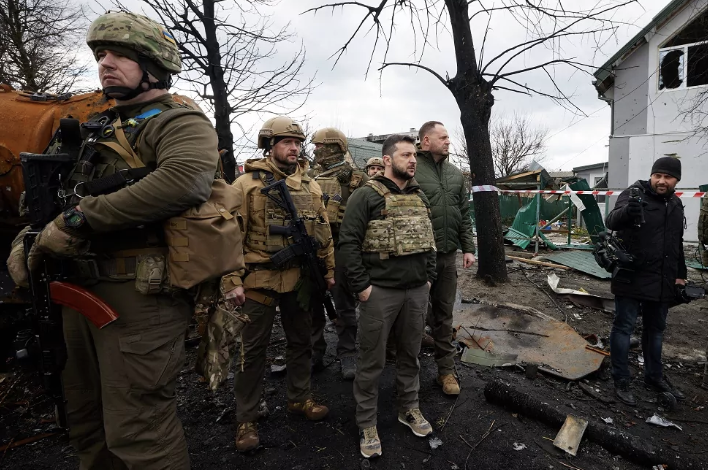News
The Possibilities in Ukraine’s African Diplomatic Asymmetry
Diplomacy is a domain where, like the battlefield, Ukraine can make inroads by using innovative and unorthodox measures.

A hallmark of Ukraine’s military success in its David and Goliath battle with Russia since the latter’s full-scale invasion in February 2022, has been its use of asymmetrical warfare.
The use of unorthodox and innovative tactics including first-person view (FPV) drones and small semi-autonomous units coupled with dollops of fighting will have enabled Ukraine’s armed forces to not only withstand Russia’s onslaught, but successfully inflict heavy losses.
And while much of this war is being fought on Ukrainian soil – and recently stretches of Russian territory – it is also being fought on the global diplomatic battleground. To be successful, as on the battlefield, Ukraine should similarly employ strategic manoeuvrability and resources as part of its wider grand strategy to achieve peace.
Since the beginning of Russia’s full-scale invasion, Kyiv has been successful in maintaining strong diplomatic relations with many of its Western allies, although this is not surprising given the ramifications a Ukrainian defeat would have for many of them. But where it has struggled to win support has been with countries that do not share the same existential concerns or whose leaders believe they stand to gain more from either remaining neutral or directly supporting Russia.
Africa is one such region where Ukraine has enjoyed mixed diplomatic results. Most of the continent’s governments voted in favour of the UN General Assembly’s Resolution ES-11/1 in March 2022 which called on Russia to end its illegal use of force in Ukraine while simultaneously withdrawing all its troops. A further 17 abstained while one (Eritrea) voted against and eight were absent. The recent Peace Summit in Switzerland, however, was less promising. Only 18 of 54 African countries were in attendance with 12 signing the Joint Communiqué outlining a pathway toward peace for Ukraine based on UN resolutions. Among those that attended but did not sign were Libya, Mauritania, South Africa and Rwanda.
Conventional diplomacy: Playing catch-up
Ukraine is playing a game of diplomatic catch-up in Africa. Before 2022, Kyiv’s engagement with the continent was limited. By the end of 2021, there were a total of 11 Ukrainian embassies across the continent with most having been opened in the decade following Ukraine’s independence from the Soviet Union. In a diplomatic paradox, Ukraine relied on the goodwill it inherited as part of the Soviet empire, a diplomatic network that was claimed, however, by Russia.
Ukraine has now realised this mistake. From January to June this year, Kyiv opened six embassies in Africa, with plans for several more in the coming months. By the end of 2024, Ukraine may be represented by as many as 21 embassies in Africa.
Kyiv has certainly realised the important role that Africa has to play within its wider diplomatic strategy, not only because of the many potential votes it provides within the UN, but also because of the significant role many of its countries play in buttressing Moscow politically or sustaining its war-machine financially.
Since February 2022 President Zelenskyy has held more than 30 meetings with leaders of African countries and pan-African organisations. In July 2022 he also appointed a Special Representative for Africa and the Middle East, Maksym Subkh. Dmytro Kuleba, the country’s former foreign minister, has completed four tours of Africa in the space of two years. All of this forms part of what the Ministry of Foreign Affairs has described as a “renaissance of Ukraine-Africa relations”.
By contrast, Russia enjoys a wider presence across Africa, boasting 40 embassies on the continent. This foothold stems partly from the relationship the Soviet Union enjoyed with many of the continent’s liberation movements that with few exceptions remain in power in southern Africa. But the Russian anti-West and anti-colonialism narrative also provides a fig leaf which allows the Kremlin to partner with many authoritarian governments and strongmen who seek to use the relationship as a means of furthering personal interests.
Whether Kyiv’s diplomatic efforts in Africa will culminate in a renaissance remains to be seen. Traditional measures which include increasing the number of missions are key enablers. However, given Russia’s entrenched diplomatic position on the continent combined with growing anti-Western and anti-democratic narratives, Ukraine will need to complement “conventional” diplomacy with more unorthodox and imaginative tactics.
Asymmetrical diplomacy is therefore necessary.
Asymmetrical diplomacy: The warring approach
One such asymmetrical technique is to leverage regional proxies to directly thwart an opponent’s influence in a territory. Ukraine is alleged to be collaborating with warring factions in the Sahel to blunt Moscow’s influence in the region.
This comes as Ukrainian military personnel are reportedly assisting the Sudanese Armed Forces (SAF) in their fight against the Rapid Support Forces (RSF) who themselves are said to be aided by the Kremlin-backed Africa Corps (the successor to the Wagner Group).
War-torn Sudan has proven to be an effective channel through which Russia has smuggled gold for the purposes of sustaining its war machine. Ukrainian support for the SAF would provide a useful proxy for undermining this channel. It could also provide Kyiv with future leverage should the SAF or senior military figures form part of a government in Sudan.
Meanwhile, in Mali, a country governed by a military junta which has been quick to discuss increased security and economic cooperation with Russia, there are conflicting reports surrounding Ukraine’s support for Tuareg separatist forces following clashes which resulted in the deaths of about 100 Africa Corps-linked mercenaries and Malian soldiers. The junta in Mali insist Ukraine was involved. Meanwhile, the Tuareg forces deny any such collaboration with Kyiv.
Such forms of asymmetrical diplomacy – while directly destabilising Russia’s interests in Africa – are dangerous. They risk causing harm to Ukraine. The military junta in Mali responded to the deaths by severing diplomatic ties with Ukraine. Niger, also ruled by a military junta, followed suit.
Ukraine’s ambassador in Senegal was summoned by his host’s foreign ministry while the Economic Community of West African States (Ecowas) responded to the developments by expressing its “strong disapproval and condemnation of any foreign interference in the region that threatens peace and security.”
In the case of Sudan, there is the risk of Ukraine becoming embroiled in a humanitarian disaster by associating itself with the SAF.
“The suffering in Sudan is a tragedy, and support for any side in such a conflict can deepen the crisis, raising difficult questions about the motivations and consequences of these choices,” says Omer Ismail, Sudan’s former minister of foreign affairs. By engaging with conflicts and warring factions in Africa, Kyiv risks sowing further instability in an already unstable region and in doing so, damaging its credibility as a country fighting for its right to self-determination, sovereignty and democracy.
Asymmetrical diplomacy: The bottom-up approach
Another tactic is to pursue a “bottom-up” approach to diplomacy by engaging with democratic and opposition entities on the continent. For Ukraine there are numerous parallels with Africa that it can share, thereby making this a potentially formidable and influential tactic.
Having recently celebrated its 33rd year of independence, Ukraine is a country which in a short space of time has had to fight for democracy and its right to exist. The Orange Revolution of 2004 and the Maidan Uprising a decade on are both examples of this democratic tradition and consolidation. In many African countries, millions of citizens are fighting for the same values and beliefs under conditions of political repression, not unlike Putin’s Russia.
Ukraine’s former president and leader of the Orange Revolution, Viktor Yushchenko, visited South Africa in March with a group of more than 50 democratic actors from across Africa to identify the growing threats to democracy and formalise the Platform for African Democrats at a meeting organised by The Brenthurst Foundation.

Even though democracy and freedom across Africa are in decline, six out of 10 Africans favour it over any other system of government, according to Afrobarometer.
Ukraine’s democratic journey can provide valuable lessons for those on the continent thirsting for democracy.
And there is certainly a desire among African democratic forces to engage with Kyiv in this regard. Tanzania is one such country which Ukraine has identified as part of its diplomatic expansion on the continent; a country whose Chama Cha Mapinduzi party has been in power since its formation in 1977 and which has either abstained from UN votes relating to the ongoing conflict in Ukraine or has been absent.
Dorothy Semu is the leader of the Alliance for Change and Transparency (ACT-Wazalendo), an opposition party in Tanzania. She believes there exists an opportunity for Ukraine to build strong and sustainable partnerships by emulating the same model seen with Nordic countries in how they engage with democratic forces in Africa.
“I would like to see Ukraine taking a leaf from countries like Denmark or Sweden where they established dedicated political foundations to work on advancing democracy globally and [in] Africa in particular by linking political parties in Ukraine and in Africa.”
Of course, this is not a straightforward endeavour. Kyiv will wish to prioritise building relationships with incumbent governments rather than invest in opposition parties whose diplomatic return on investment would appear negligible so long as they remain on the fringes of government.
There is also the concern that engaging with opposition parties could undermine any efforts to forge closer ties with incumbent governments. But they provide a point of leverage where it is absent, not least since today’s opposition can, as Zambia and more recently South Africa remind, become tomorrow’s government.
Here lies the main question for Ukraine: What are its diplomatic goals for Africa and what are its capabilities for doing so? Each approach outlined above – conventional, warring, and bottom-up – has its strengths and weaknesses, risks and rewards.
Ukraine’s ability to out-manoeuvre, out-think, and out-innovate Russia on the battlefield yielded tremendous success; it will need to apply similar measures on the diplomatic battleground if it is to make inroads in Africa and counteract Russia’s legacy influence.
This article originally appeared on the Daily Maverick


